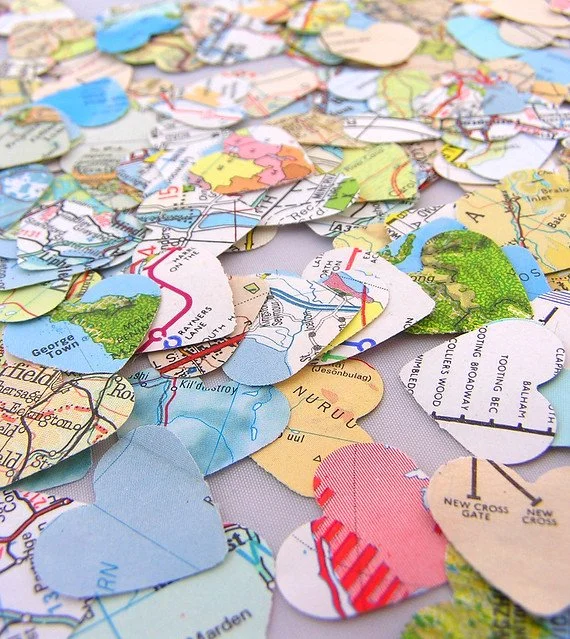Where are you from - and what does that mean?
By Aoife O’Driscoll
Image credit: Bombus Design, via Flickr
Names hold meaning: whilst this fact may be clear for our own names, it is a little less obvious for place names. Towns, cities, and countries serve as location labels, but the names themselves are often taken for granted, and rarely delved into. This idea was not something I had ever really considered until I learnt the origins behind the name of one of my most frequented local cafés - ‘Crow’ - the name inspired by the etymology of my hometown Crawley, originally ‘Crow Leah’ (meaning a clearing infested with crows).
This insight opened the door to my discovery of onomastics - the study of the history of names, a field which has fascinated linguists for centuries now. The focus of linguistic onomastics greatly centres around the etymology of names, tracing back their meaning, and exploring the function of names within society.
But what separates names from other kinds of words? While they can be technically categorised as nouns, they function in a different sense - their primary use centres around identification, while for general nouns, this centres around meaning. For instance, you would have to understand what is meant by a ‘house’ or a ‘cup’ to talk about them meaningfully. However, you don’t need to know that Liverpool developed from Old English ‘lifer pol’, meaning a pool of muddy water, to talk about the city. All that is needed when it comes to place names is what it is referring to: in this case, a city in the northwest of England. This distinction has consequences within language development as well: as the function of names is less meaning-focused, they become more susceptible to phonological (sound-based) change.
The linguistic perspective seems to suggest that names do not actually hold any kind of ‘real’ meaning, beyond the historical, and are only necessary for identification. Yet it is not even always true that the historical meaning is the one which is accepted - place names are also often victims of ‘folk etymology’, where the origins of the word are incorrectly assumed. For instance, it has been said that Haltwhistle, a town in Northumberland, came from an invader saying ‘Halt! I hear a whistle!’, when in reality, the meaning is not so literal. Instead, the name has developed from earlier form ‘Hautwesel’, believed to be roughly translated as ‘the hill-top between two rivers’. If the original meaning is so easily lost with no impact on the ability to coherently talk about a place, then is there anything meaningful about the names assigned to places?
Yet though place names may not hold the same linguistic meaning as other words, seeing them as nothing more than labels seems to take away from the fact that they can provide historical, geographical, social and political insights into the locations, and why they were named as such. The origins of ‘Cambridge’ show that the river, and the bridges, have always been a key element to the city. Other places in England show remnants of Danelaw, the area controlled by the Vikings. A key piece of evidence that a town or city was in Danelaw is its place name: if the suffixes -thorpe, -by, or -kirk feature, it's likely the name has Viking origins. And though my hometown is now much more than a crow-infested clearing, its etymology shows what it was first known for, and gives a connection to its past. These place names provide some insight into what seemed important about an area to the people at that time - what its defining features were, and what they wanted the area to be known for.
Within England, place names generally reflect a time period where the language was almost unrecognisable, and provide more historical insight into an area. However, in other areas around the world, place names can be purposefully given as a prominent marker of the identity of the people living there today. Consider, for instance, Zambia and Zimbabwe. Though these names are taken for granted today, they have only been officially known as such since 1964 and 1980 respectively. Prior to that, they were known as Northern Rhodesia and Southern Rhodesia, names reflective of the colonial control that the countries were under at the time, as they were named after Cecil Rhodes, founder of the British South Africa Company which led this colonisation. The independence of these countries allowed for them to return to names that accurately represented their people, and not the control of other countries over them. Furthermore, a petition has been made recently pushing for New Zealand to change its name to Aotearoa, the Māori name for the country. Similarly to Zambia and Zimbabwe, this case calls for a return to the country’s indigenous roots, and away from the name as a tool used to ‘claim stake’ on a country.
Though this petition has not yet been resolved, it demonstrates a difference between the ways that meaning holds relevance. While linguistically, the meaning of place names may not be as important, personal meaning should not be discounted, and, in that sense place names are more to do with identity than identification. Place names are different to other nouns - they are not incidentally existent, but stem from an intentional act at some point in time to reinforce the identity of their location. That distinction in itself holds great meaning.
